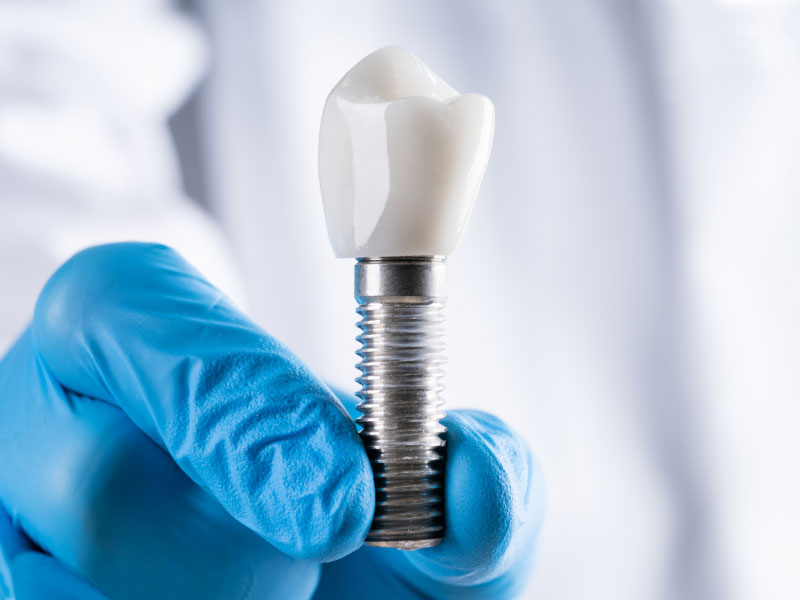Dental Implants at Your Summerlin Dentist

What is a dental implant? Why would I need one? What does it entail? These are all questions you may be asking yourself right now. Luckily, we have the answers for you! Perhaps you may be in need of a dental implant and you’re trying to learn a little more about it. In which case, we’ve got your back! Let’s take a look at what dental implants are, and cover some of the main things you should know about them in order to make an educated decision regarding your dental health.
The Breakdown – What Exactly is a Dental Implant?
As defined by the U.S. Food & Drug Administration, dental implants are medical devices surgically implanted into the jaw to restore a person's ability to chew or restore their appearance, and they provide support for artificial (fake) teeth, such as crowns, bridges, or dentures. Essentially, dental implants are the closest you can get to healthy, natural teeth.
The dental implant itself is a small, titanium post that is bonded with the jawbone and acts as the artificial tooth roots. They are made from titanium because it is a type of metal that is not only extremely strong, but it will not rust over time, and will not be rejected by the body. A connector called an abutment is then attached to the dental implant body in order to support the artificial tooth. Finally, a prosthetic such as a bridge or a crown is attached to the abutment and dental implant body to complete the dental implant system. Dental crowns, the most commonly used prosthetic, are custom made for each individual patient in order to best replicate and match the natural tooth shape and color, making it nearly impossible to distinguish the difference between a dental implant and crown compared to the patient’s natural teeth (American Academy of Implant Dentistry, 2023).
Why Dental Implants Are Needed
With over 3 million people in the United States currently having dental implants, and that number growing by another half a million a year, there are quite a few reasons why someone may need a dental implant, but here are the most common. (American Academy of Implant Dentistry, 2023). Long story short, dental implants are needed to replace a missing tooth. That missing tooth can occur from a multitude of reasons: extreme decay, genetics, a cracked or dead tooth, or a crazy accident. Whatever the reason, it’s critical to replace the missing tooth or you could suffer from a host of negative side effects in the future.
Teeth, whether natural or dental implants, help to hold the adjacent teeth in place and keep your bite healthy. They also help prevent bone deterioration by stimulating the nerves in the jawbone that create growth. Without a natural tooth or dental implant in place, your teeth can begin to shift, your jawbone atrophies, and you will soon experience more and more dental issues, not to mention a change in appearance. Besides the obvious gap that can potentially be seen in your smile, having missing teeth that are not replaced can cause change to an individual’s facial structure, making their face appearance sunken and often dramatically different.
Aside from the more serious dental issues that can occur with missing teeth, there are the day-to-day problems that come along with missing teeth as well. Many patients struggle with simple tasks such as eating or speaking when they are missing teeth. They can struggle tremendously with their self-confidence and mental health, and those small day to day problems begin to add up and take a toll. Dental implants help to solve all of those issues.
Recommendations for Dental Implant Patients
The U.S. Food and Drug Administration has a great set of recommendations for patients who are considering getting dental implants, or who have recently received dental implants that we always share with our patients as well. It’s important to understand whether or not you are a good candidate for dental implants, the risk factors, and what to expect post procedure, here’s a quick overview of some top points to consider:
- Your overall health is a very important factor when determining whether or not you are a good candidate for dental implants, how long the healing process will be, and how long the implant may stay in place.
- Always ask your doctor what brand and model of dental implant system is being used so you can keep this information for your records. (At Willow Springs Dental, we always ensure this information is provided to our patients).
- If you are a smoker, this could not only affect the healing process for the implant, but it could also decrease the long-term success and longevity of the implant.
- The healing process for the implant body may take several months or longer, while you wait for the implant to health and the ‘permanent’ prosthetic to be placed, you will most likely have a temporary abutment in place of the tooth.
After the dental implant procedure:
- Be sure to very carefully follow the oral hygiene instructions you are given by your doctor. Proper care and regularly cleaning the implant and surrounding teeth is exceptionally important for long-term success of the implant.
- If your implant feels loose or you are experiencing pain or other issues, consult your doctor right away.
Dental Implants at Your Las Vegas Dentist – Willow Springs Dental
At Willow Springs Dental, we change lives every day through innovative dentistry. Not only are we the top cosmetic dentist in the Las Vegas area, but we have a wide array of dental services our team of experts provide for our patients every day. From regular teeth cleanings and exams to the most complex full mouth reconstruction, our team provides the best care with the highest levels of both empathy and efficiency. If you’re looking to improve your smile, schedule a consultation today to start on your journey to your dream smile.



